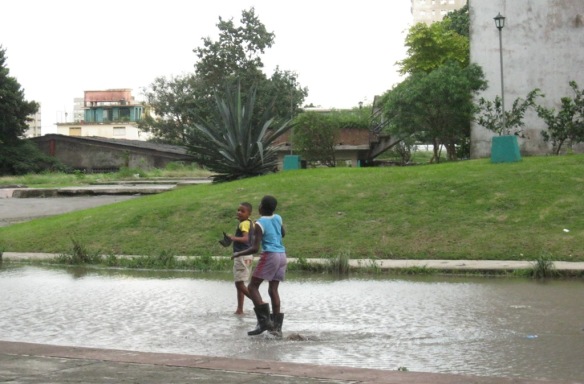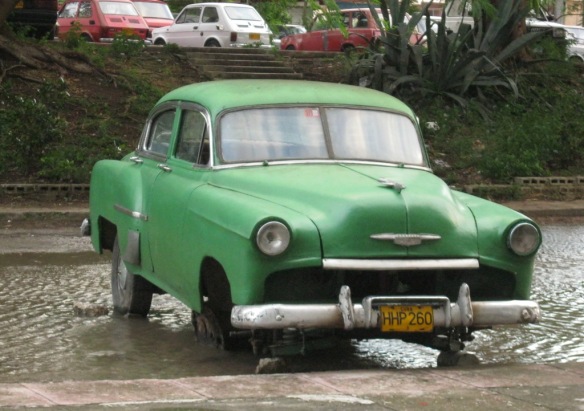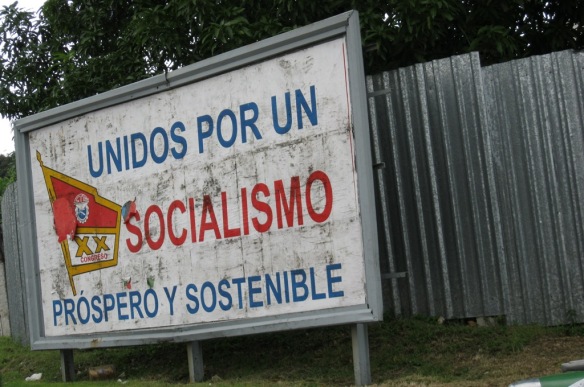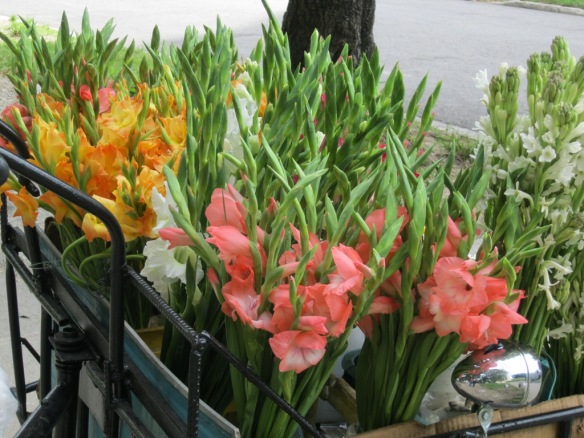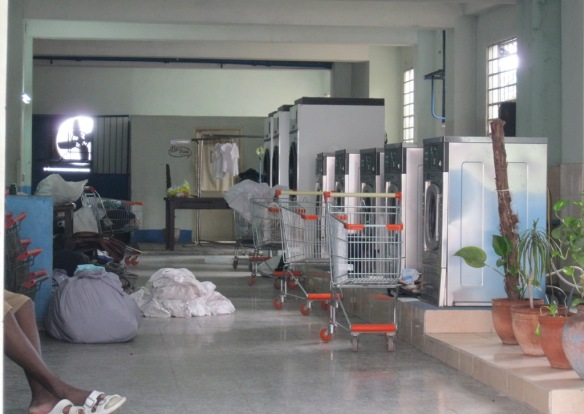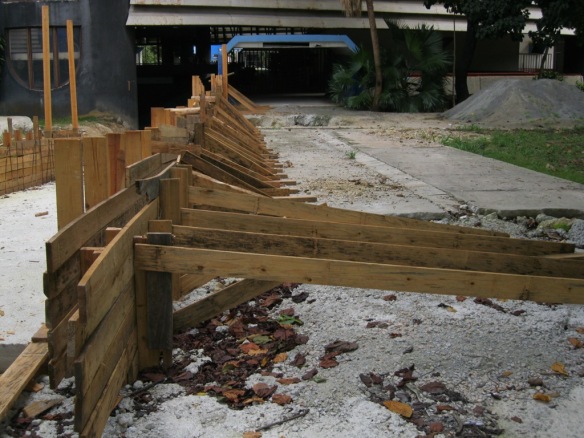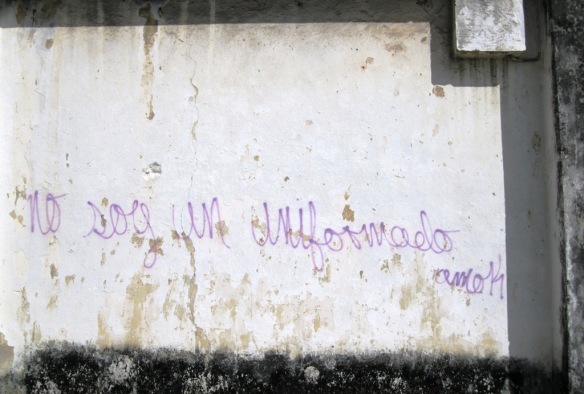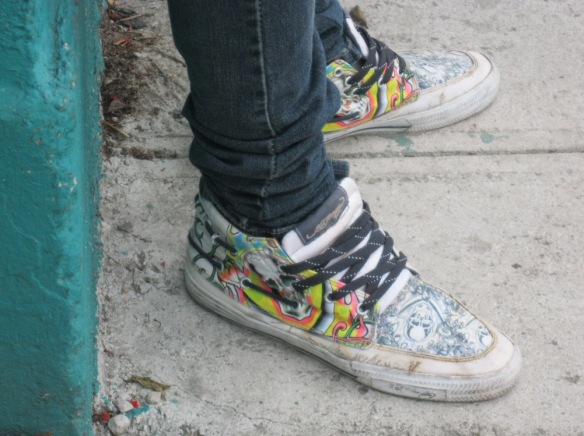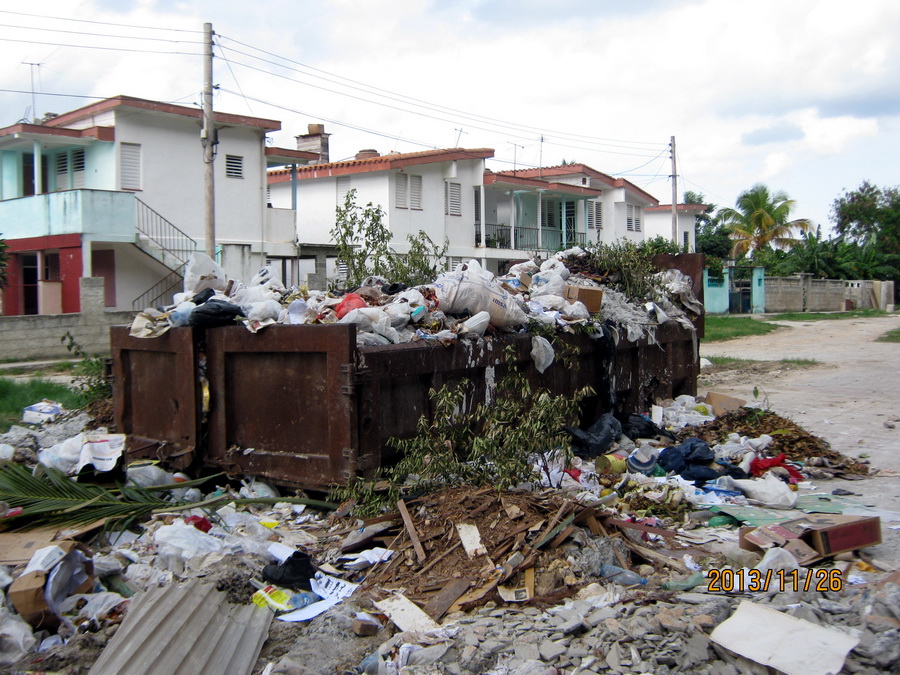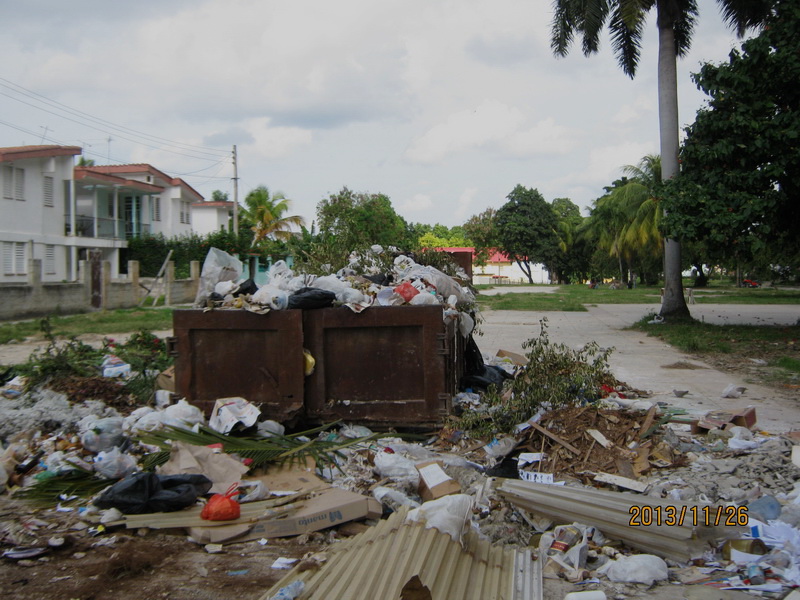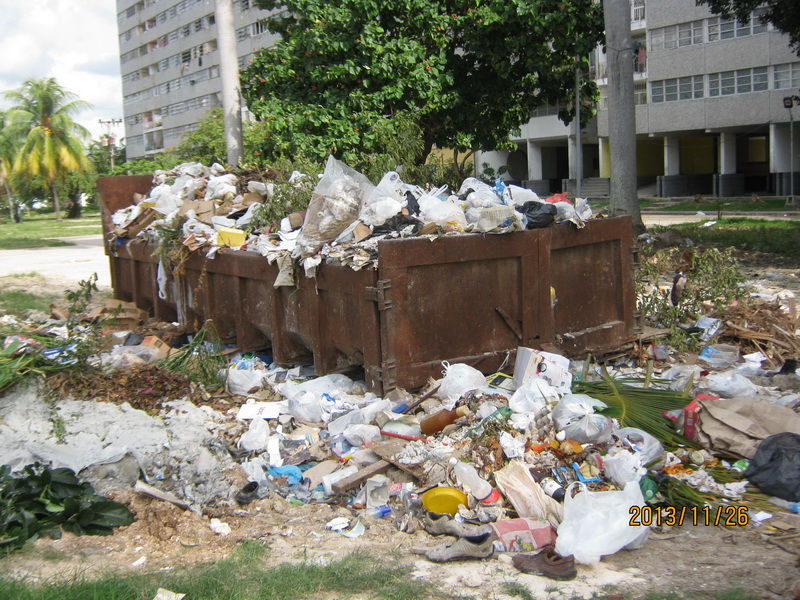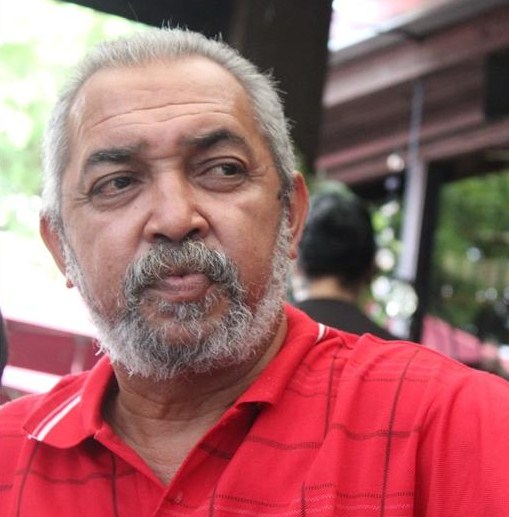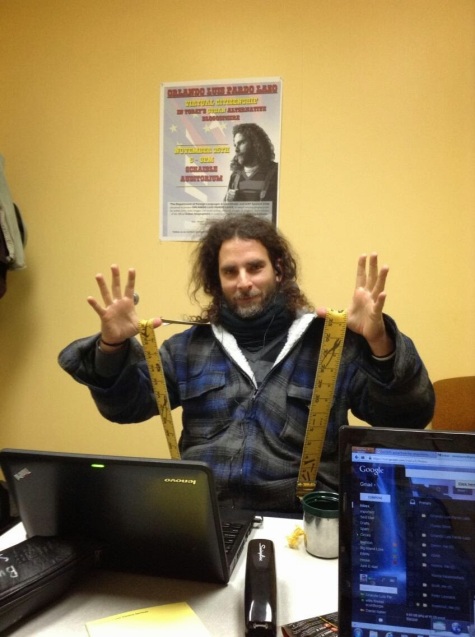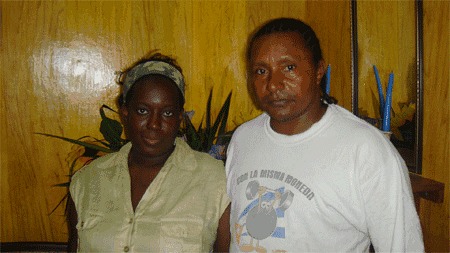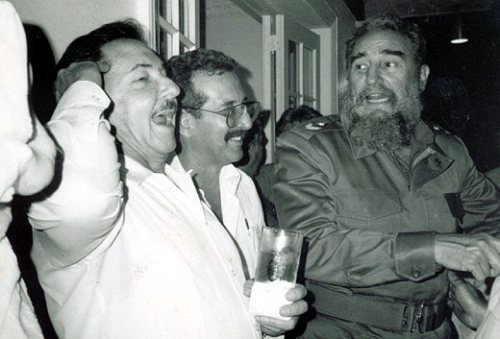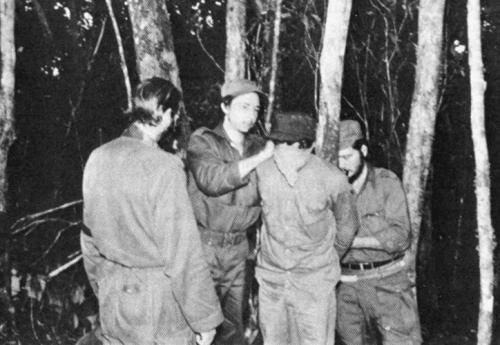United / Luzbely Escobar
New Street / Luzbely Escobar
I’m Not In Uniform / Luzbely Escobar
NONcommunal Solutions / Rebeca Monzo
“Communals” is the People’s Power Company charged with garbage collection, among other tasks.
Behind the “12 Floors,” as they call the building in the block formed by Tulipán, Loma, Colón and 39th streets in Nuevo Vedado, the solution to trash collection for this gigantic apartment block, as well as for the adjoining houses, has been to place an enormous dumpster there to collect the garbage. This huge container is left uncovered, exposed to wind, rain rodents and insects. The space all around it is fulled with empty plastic bags, paper, cans and every kind of object, which the residents themselves throw there, on finding the container overflowing. This is without taking into account the stinking sewage that leaks from the sewer pipes coming out of the building itself, which leads to the subsequent contamination, which makes it almost impossible to walk by the place.
According to what some residents told me, it can take a week or more for the crane that is supposed to lift the container to come by to collect it, not to mention that in doing so, it is carried across the city to its destination, contaminating everything along its long journey. They also tell me that the garbage trucks don’t have the necessary equipment to collect what is outside the containers, so they leave this trail of filth which is gradually blown all over the pavement by the wind.
With this in the environment there is no point in going any further to invade the privacy of the residents, but the famous health brigades try to force their way into people’s apartments without any prior notice, fining those who have a bowl of water, not to mention that the fumigators, who use that annoying burning oil, tell you to close and leave your house on the pretext of eradicating the mosquito that causes dengue fever, an illness than has become endemic due to the unhealthy conditions prevailing in the city.
2 December 2013
The Cuban Writers Club / Luis Felipe Rojas
Men who believe themselves to be free manage to break the bars imposed on them by authoritarian regimes. The Cuban Writers Club (CEC), established in Havana in May 2007, is an initiative that arose from the desire for free literature, poetry out loud, and a way to rub up against life as if they were living in a free country. A couple of weeks ago I had the good fortune of having lunch and chatting with one of these free men, Víctor Domínguez. Armando Añel delivered him through the crazy Miami traffic.
“A group of writers, some of the members of the official National Union of Cuban Writers and Artists (UNEAC), others from the Hermanos Saiz Association (AHS), but all of us marginalized from the institutional spaces because of ideological problems, realized we needed our own independent space. We are more than fifty writers from the whole county, and twenty of us have published works, which is an accomplishment,” says Victor Manuel Dominguez, co-president of the Club.
Dominguez is one of Havana’s veteran independent journalists who survived the hardships, arrests and police harassment. “Twice they have expelled Jorge Olivera Castillo and me from literary and cultural meetings we were attending — once it was in the Cuba Pavilion — and we have to say that we are here and we are going to continue doing our literary work despite the repression and censorship,” said the author of the banned and still unpublished novel, “Operation Cauldron.”
The fruits they already taste
Jorge Olivera Castillo is one of the independent journalists who has survived hardships of every kind. He is the founder of Habana Press, a banned press agency born in the long past year 1995; he was sentenced to 18 years in prison in the well-known Black Spring of 2003, and today has nearly a dozen books published by helping hands around the world.
“It was prison that made me turn to literature, and especially being at the side of Raul Rivero, unfortunately now in exile. I was in solitary confinement for a year, in a cell in Guantanamo, six hundred miles from my home in Havana, but literature helped me to survive,” Olivera Castillo said with pride.
The award of the Franz Kafka Novels from the Drawer Prize to Frank Correa Romero in 2012 for his work “The Night is Long,” and that fact that 2010 was “a great year” for Olivera Castillo, made them realize they were beginning to reap what they had sown.
Jorge Olivera Castillo has published nearly a dozen books of poetry and prose. Publishers from half the world have helped him, not because of his having been condemned to 18 years in prison in the 2003 Black Spring, the only criterion is the quality of his writing. Olivera saw his book of poems appear almost a decade after they were written: “Lit Ashes” (Polish-Spanish, Lech Walesa Institute, 2010), and from Galen Publishing (French-Spanish) “In Body and Soul,” which had been published in 2008 by the Czech Pen Club.
The world, all the worlds
In Havana, the Swiss, German and Czech embassies have opened their doors to these bards to develop their literary gatherings, blocked by the authoritarian regime. The German Romantic Period, the work of A. Von Humboldt, the dramas and poetry of Polish writers, as well as readings by their own members, are part of this unique Writers Club.
The digital magazine Puente de Letras (Literary Bridge) contains all of this flood of creation: the list of its members, the prizes they have won, fragments of works half done and on their way to publication, are part of the mission of this attractive digital site.
Authors such as Luis Cino Álvarez, Juan González Febles, María del Carmen Pino or Manuel Cuesta Morúa have presented their stories, poems or essays on the Puente de Letras magazine and website.
Looking ahead, they have made this bridge to the future. “This is a source of feedback, you write and life gives you these prizes: the books, the friendship, the sharing,” Olivera concluded.
2 December 2013
The Market Where Cubans Pray for Renewed Abundance / Lilianne Ruiz
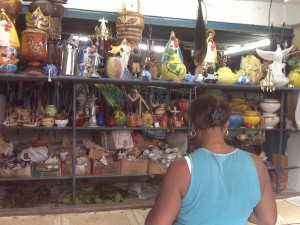 HAVANA, Cuba, Novemer 2013, www.cubanet.org — Back then there were images of abundance. Our elders say it was a gift to the senses. Memory arouses a nostalgia for a kind of lost paradise.
HAVANA, Cuba, Novemer 2013, www.cubanet.org — Back then there were images of abundance. Our elders say it was a gift to the senses. Memory arouses a nostalgia for a kind of lost paradise.
El Mercado Único. Amelia, 80 years old.
“It was quite a city, quite a city. It was cheap, cheap… All the fruits and vegetables you could want. Cuban fruit (frutas de caney). The Chinese brought in apples. There were apples from California in wrapped in Chinese paper. They were in a basket that said they were from California. The fish was fresh. The fishermen went around with zinc coolers where they kept the fish on ice. They got the fish fresh off the boats. You could find fish anywhere. If you wanted lobster, they would sell it to you live. There was parguito, the best fish I ever had. And bass cut into steaks. There were Chinese and Italian restaurants. I remember, when my husband and I would go to a cabaret, we would stop there at one or two in the morning to have some wonton soup and it would be full of people. All that is gone now.”
Nowadays the Mercado Único (One-of-a-Kind Market) is known simply as Cuatro Caminos (Four Roads). The downstairs looks as though some Lilliputians launched a “Haitian revolution” and exiled Gulliver. The only horn of plenty to be seen is the one carved in stone on the face of the building. Remarkably, it remains intact. In spite of Raul Castro’s economic reforms legalizing self-employment, there are only a few small, almost invisible businesses. Outside a CADECA currency exchange office, with its sign advertising 90 convertible pesos for 100 dollars, there is only a liquor salesman and someone hoping to find customers for a few animals at the building’s perimeter.
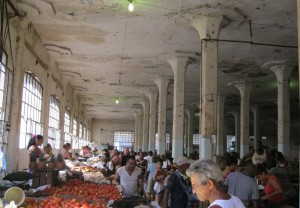 The building itself is falling apart. The roof, supported by steel-reinforced columns (well-worn Herculean columns), is damp and the trapped water seeks an escape route through cracks in the ceiling, threatening the structure with collapse.
The building itself is falling apart. The roof, supported by steel-reinforced columns (well-worn Herculean columns), is damp and the trapped water seeks an escape route through cracks in the ceiling, threatening the structure with collapse.
Fruits and vegetables are still sold in one wing of the market. The vendors swear that you can find products there that are not for sale in any of Havana’s other “agros” or farmers’ markets — fruits like canistel and guanábana. Seventy-year-old Angel says, “Those of you who were born later don’t know about Cuban fruits. So much has disappeared that we no longer even have names for things.”
At the entrance on Manglar Street (now Arroyo Street) there are large cages with live poultry for sale. A young man wearing an attractive necklace of red and black beads approaches us. His name is Ronald Rodríguez, but tells us we should call him by his religious name, Eshu bí, which means Son of Elegguá. In Afro-Cuban mythology this orisha, or Yoruba deity, is the protector of travelers and the deity of crossroads. After saying hello, he proposes a barter exchange: “Put my photo on Facebook.”
“We sell animals to Santeria followers and practitioners, who use them in their rituals to save people,” he says.
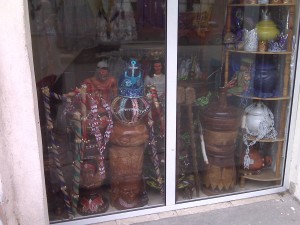 An animal vendor (who asked not to be identified) says that on average eighty people a day make purchases there. He notes that the sale of goats and sheep is illegal within city limits, which makes it more difficult to get animals. Now the “animaleros,” as they are called by Santeria followers, only do work on special request.
An animal vendor (who asked not to be identified) says that on average eighty people a day make purchases there. He notes that the sale of goats and sheep is illegal within city limits, which makes it more difficult to get animals. Now the “animaleros,” as they are called by Santeria followers, only do work on special request.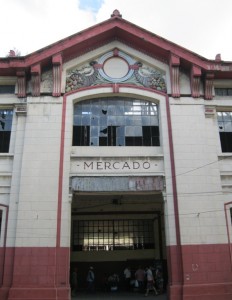
An interesting phenomenon in the vicinity surrounding the market is the number of traditional Cuban Yoruba religious articles for sale. What previously had been modest businesses selling these items have become veritable boutiques, with windows displaying art associated with Afro-Cuban sects. A wood carving might cost 900 CUC (or roughly 900 US dolllars).
One of the store owners
According to Yoruba tradition, public plazas are where one finds both the living and the dead. In Cuatro Caminos residents of Havana turn to the four street corners (the four cardinal points) to ask the blessing of Olofi and the spirits who live in the plaza. The most popular items for sale here are herbs, coconut and candles, which are used to “make a saint,” a rite of initiation. Some people shop for herbs for use in spiritual cleansing rituals.
Materials come from Mexico
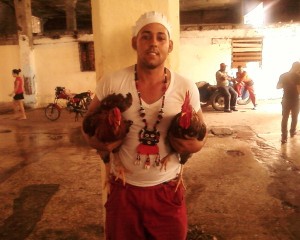 “There are seamstresses who make priestly garments. We bring in the materials from Mexico. Artisans make the beaded necklaces and bring them to us. We have everything here that people need. Everyone has a retail license. In the old days, until the early 1960s, herb vendors used to operate out of pushcarts. You can’t have pushcarts on the street anymore, but the herbalists can sell out of their homes. Cuba has created a Yoruba religion with the hope of prosperity.”
“There are seamstresses who make priestly garments. We bring in the materials from Mexico. Artisans make the beaded necklaces and bring them to us. We have everything here that people need. Everyone has a retail license. In the old days, until the early 1960s, herb vendors used to operate out of pushcarts. You can’t have pushcarts on the street anymore, but the herbalists can sell out of their homes. Cuba has created a Yoruba religion with the hope of prosperity.”
Cuatro Caminos is still an exceptional place, a point of confluence with access to any location in Havana. Calle Cristina (Cristina Street) leads to Avenida del Puerto (Port Avenue) where there used to be a ferry with daily roundtrip service between Havana and Key West.
After 1959 the new revolutionary government banned private property along with civil and political liberties in the name of a dubious majority. With them went citizens’ freedom and rights.
Lilianne Ruiz
Cubanet, November 25, 2013
FAREWELL CUBALASKA, WELCOME MANHATTAVANA / Orlando Luis Pardo Lazo
I arrive at the little house in Queens after a week in Alaska. Six intercontinental planes. Minus twenty degrees Celsius and the noonday sun peeking over the horizon. I was so free and so happy. I am going to love there, under the Fairbanks Aurora Borealis. My son will be born there. And he will be as Cuban as you. Or more so. Because he will have no memory of horror.
I arrive at the little house in Queens and fall down dead on the couch. I don’t even unpack. I’m dying of hunger. I have almost no voice. If I get sick in the United States I will have to heal myself alone. To go back to Cuba would be suicide. There the doctors from State Security would wait for me to fulfill their mission.
I go out and get some Colombian roast beef with rice and red beans. They put a slice of avocado on it. Nothing tastes like anything, but in the United States that’s how it is. The smell revolts me. I stay hungry.
Actually, I don’t like buying from the Latinos in the neighborhood. They have a mortuary look that even post-Castro Cubans don’t have. You go into the restaurant and they look at you like iguanas, with toothpicks between their teeth and the ugliest clothes in the world, exceeded only by the schmaltzy music playing.
I bought it anyway. Chewed a bit. Then, I toss the whole mess into the trash. Or not. I go to toss it, but I can’t reach the can in the kitchen. Because at that instant there’s a little mouse in the middle.
It’s gray. It’s starving. It’s clear that it spent a week without me, locked out of the little house in Queens without a thing to nibble. It must be very young. Now it’s almost begging me with its eyes, like a spontaneous pet. it would be so easy to smash it with a shovel. That’s what we’d do on the little island.
But I put the leftovers in a plastic bag. I almost put it in his mouth. And the mouse started to eat the rest of my food in the little house in Queens. Every now and then he looks at me. I look at him. We look at each other. We’re both fucked up. Alone. Helpless. Nobody would remember us if we didn’t help each other.
I kick back on the couch. This is exile. Substitute for what in Cuba would have been a bloody death a hint of mutual pity and solidarity.
29 November 2013
Bastion 2013 and the Ghost of the Enemy /Orlando Delgado
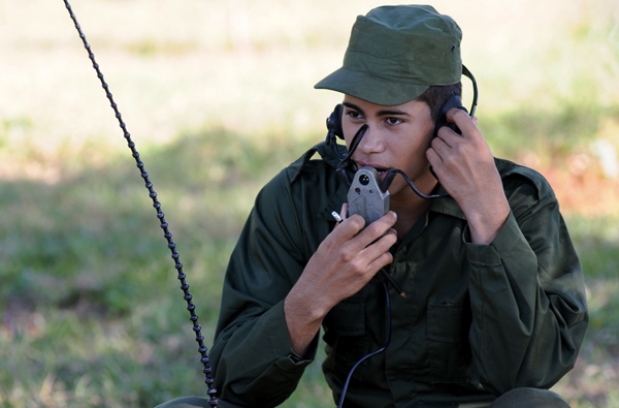
It happened in the early morning hours of Monday, 19 November: suddenly the usual transmissions were cut and all the official TV channels were linked. Many thought it might be news of great impact: the death of Fidel Castro or something like that. The image of Raul Castro raised the expectation. But it was all a big fiasco. Castro II announced the beginning of the military exercises all over the country. Perhaps war is coming, many wondered.
We all know how far the country is from participating with its men in any of the conflicts that plague the planet. The regime doesn’t have the will nor the resources for it. The words of the General were clear: “With the engagement in this exercise we propose top continue raising the level of preparation and cohesion of the organs of leadership and control of the troops (…) to confront the different actions of the enemy.”
It remains doubtful what actions they’re thinking of resisting, because any moderately informed person knows that “the enemy” is not planning any military actions. It’s a great blunder to believe that the United States (a country with which we have ties of all kinds) is thinking of a military attack on Cuba. This is the strange idea that the regime constantly tries to sell to justify huge and unnecessary military expenditure in a bankrupt economy, as well as for maintaining internal repression.
Bastion 2013 — as these maneuvers are called — are simply intended to remind Cubans about “our eternal struggle against the empire,” in line with the Castro ideal that “as long as imperialism exists, the Party, the State and the people will offer themselves to the greatest defense. The Revolutionary guard will never be neglected.”
It’s well known that, lacking enemies, totalitarian systems invent them, their livelihood depends on confrontation with an external rival that supposedly tries to “colonize” or “invade” the national territory. Such an archaic idea in the 21st century, with an economic interconnected at the planetary scale, and where borders tend to disappear, is obvious to the least of the analysts.
The Cuban leaders live in another epoch, disconnected from reality. They force citizens into a condition of western pariahs in the era of the Internet and smartphones.
One of the collateral objectives of these useless efforts in which university students and other sectors of society participate, is the constant glorification of violence as the only method to resolve the differences that exist in any modern community, to the detriment of the peaceful way.
Reconciliation and open dialog among all Cubans (living where they live and thinking how they think) should be the fundamental premise for the rebirth of the country, leaving being once and for all the ballast of Castro’s totalitarianism that today oppresses is. Cube is not a bastion and the vast majority of its people just want to live in peace. The speeches of the barricade have died and the only Stalinist dictator of the West — without a doubt — also has an expiration date.
Orlando Delgado
From Diario de Cuba, 25 November 2013
Ramon Alejandro Munoz, Sonia Garro’s Husband, Writes to the Daughter of One of the Five Spies
COMBINADO DEL ESTE, 28 November – In Cuba, “Free Territory of America,” there is a population of almost 12 million inhabitants. This entire population suffers terrible disappointments when their family members are taken to prison for fabricated reasons and without any proof; but it turns out that in various newspapers and magazines they have publications about the so-called Five Heroes, and the family of Ramon Labañino – one of the Five – have made statements about it.
I don’t know young lady, what story you have been told, but in the prisons where your father is there are things you can never do in the Cuban prisons.
For example, in the Cuban magazine Zunzún, there was a story where you and your sisters are at the prison with your father, and the magazine commented that they didn’t allow you to take cameras in; so who took that photo? You say they don’t allow him to touch you but in one of the photos he’s holding your hand.
Do you know how the prison regime works in Cuban prisons? Clearly no. Well, I’ll tell you and we can compare the two systems.
For your information, in Cuban prisons there are also political prisoners; in the prisons of Cuba they torture and kill; there are thousands of inmates suffering constant attacks by the guards, and no executioner has paid for his crimes.
In the prisons of Cuba, and particularly in the maximum security Combinado del Este prison, the food is scarce and of poor quality; sometimes it is even rotten.
In the Cuban prisons they don’t let family members bring food to the visit, mayonnaise, hot dogs, pizzas, sweets, oil, ham, rice, much less meat and natural homemade juices. The letters to your children, wife, or other family members can’t be taken by them, you read them to them and then tear them up.
The human conditions are appalling; the hygiene worse. Privacy is violated, because they search even your genitals after a visit. We are all humiliated and treated like animals. Just like the Nazis did in concentration camps.
It could be that your mom hasn’t told you about the terrorists who planted the bombs in the Bodeguita del Media and the Copacabana Hotel, where some Italians lost their lives.
Because, young lady, Chávez Abarca y Cruz León — authors of this terrorist act — are in Combinado del Este prison in Havana, and they enjoy conditions that we who are Cuba, legitimate children of this earth that saw our births, don’t have.
They have telephones in their rooms, fans, fridges with cold water, good quality food and get high quality medical care from a good medical commission, while we can die and a doctor doesn’t show up.
On the Round Table program, shamelessly, to denounce the bad diet suffered by the “five heroes” they explained that for more than a week they were eating chicken without potatoes, that there were no onions with the steak, and that the ice cream was melted.
To us, Cuban prisoners — especially the political prisoners — we have potatoes without chicken, onions without steak and we’ve never seen ice cream here; but fine, most Cuban citizens can’t enjoy these foods.
Six pounds of sugar, half a pound of oil, seven pounds of rice, 10 ounces of beans, a 90-gram bread per person, this is all that the “Benefactor State” can guarantee its people on the ration book for more than half a century.
We’re fed up hearing the Cuban Government say that we have an economic blockade imposed by the United States for more than 54 years, because really in Cuba there are three blockades, the blockade the Cuban Government has against its own people, the blockade in the prisons, and the racist blockade.
What irony! In 2000 Fidel Castro proclaimed that of all the projects he was most passion about that of converting prisons to schools, because it is the most humane, the most just and socialist; but it seems that Fidel Castro brought his project to fruition backwards, and there are schools that have been converted into prisons.
Perhaps you know that State Security will not allow our fellow travelers in the cause to visit us in prison, and the Ladies in White are brutally beaten for peacefully demanding the freedom of political prisoners?
Would you like it if you, your sister, your grandmother, your mom and other members of your family were beaten for asking for freedom for your father? I’m sure you wouldn’t.
Do you know that my wife, Sonia Garro Alfons — political prisoner and Lady in White — was injured in her left leg by a gunshot just for failing to agree with the Fidel Castro regime?
She is a prisoner; I see her every three months in a pavilion, that’s only 4 times in a year. They use this to punish us and the room they give us is that of those condemned to death or life in prison; it has iron bars and a locked aluminum door; also there are microphones and cameras.
Does it seem to you, young lady, that this is fair? What despair. The person who is writing to you is Ramón Alejandro Muños González, Cuban citizen, political prisoner and independent journalist; married father of 12 children.
Currently I am an inmate in Combinado del Este prison, condemned to 14 years of privation of liberty; and my wife, Sonia Garro, was unjustly condemned to 10 years in prison. Both my wife and I are heroes, but that’s not what your parents told you.
Note: This letter will be sent to the Council of State; the Round Table; the newspapers Granma, Rebel Youth, and Workers, and the magazine Calle del Medio; to the digital site Cubadebate; the radio station Radio Martí; and all the Internet sites that want to show solidarity with our cause.
30 November 2013
ALASKA AND MY DAD / Orlando Luis Pardo Lazo
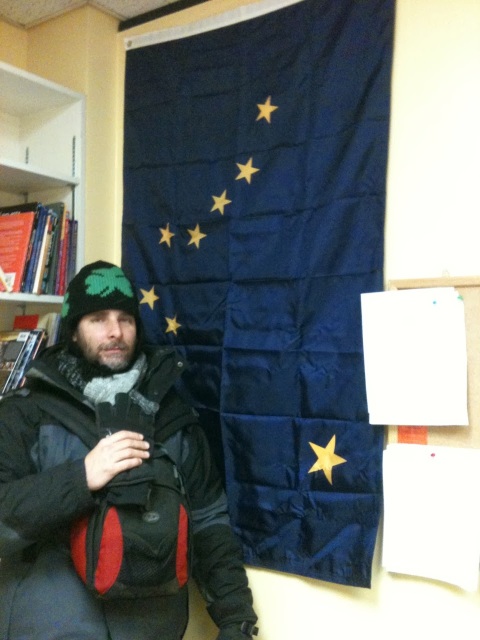
ALASKA
Orlando Luis Pardo Lazo
“Would you like to live in Alaska?”,
my father used to say.
“If you never go to Alaska, son,
death will surprise you incomplete”.
Mysterious words
pronounced in the late 70´s of an island
under the shrieking socialist sun of
La Habana.
Words not in English
nor in Spanish, of course,
but in a Cuban jargon with no references:
a dead tongue that in my childhood
sounded
as a curse.
I was 9 or 10
or maybe no age at all
and I looked as frightened as today.
But I had my father
which was also my grandpa
although he talked of death
and
Alaska
and
other incomprehensible
fates.
He was 52
when I was born
in the early 70´s of an island
under the socialist sunny shrieks of
La Habana.
Besides the transparency
of his Sicilian eyes,
I inherited two private homelands
from dad:
chess
and
English,
two labyrinths hard to distinguish
in the magic of his bookshelf.
We lived in Lawton
a delicate neighborhood
in the outskirts of La
Habana
now turned into a suburban wasteland
in the outskirts of La
Revolución.
My father so humble
so lucid
so loser
so tamed under the spell
of the official speech,
swallowing permitted pills
to overcome his nightmares of
Alaska
and
death.
My father so much my
grandfather.
He retired when I was still a kid.
Here and there he insisted
with his northern case
(technically, an escape)
calling me sometimes
“son”
and sometimes
“grandson”.
He hated life under Fidel
for sure
but this was something nobody around him
ever
guessed.
My father so shrewd.
He thought he would survive the
Commander in Chief.
But August is the cruelest month.
And on the 74th birthday of the
Maximum Leader
my father was generous enough
as to pass away
thus losing forever his bet
with his former Jesuit classmate:
Fidel.
It was a sudden Sunday and grandpa
had just turned 81.
An amateur autopsy
told us later he had cancer,
a merciful metastasis
that put him to sleep with no nightmares
and
no pain.
Never been to a doctor.
Never suspected a thing.
Just a couple of coffee-like throw-ups
and the transparency of his Sicilian eyes
became so opaque.
Maybe he did win his bet
with the decaying corpse of
Fidel.
“Forget about life in Alaska, son”,
were almost his last words:
“there´s not such a place on Earth”.
His name was Dionisio Manuel Pardo Fernández
(almost a 19th century name).
Since then,
I has taken me 13 years to understand
I wouldn´t need to pronounce more
his long and musical name.
No need to take him out of his sacred chamber
where decades and decades of American magazines
were frozen after the splendor of the 50´s
in his bookself.
His reading resistance resembled
the dearest delusions of a Don Quixote in La Habana of
Fidel.
I´m sorry, grandpa.
A deal is a deal, dad.
Not only there was indeed such a place on Earth called
death
or
Alaska
but I am here now
to challenge you to display
the chessboard
over those archaic English dictionaries
bought in the 80´s for a couple of Cuban pesos in
La Habana.
1. Pawn King-Four.
I know how you will defend.
Once Sicilian, always Sicilian.
The terminal transparency of your eyes
makes obvious that black square
now emptied for the ages.
1. (…) Pawn Queen-Bishop-Four.
Note: Original poem is in English
30 November 2013
Prison Diary LXX: Maturing Maduro in the Raul Castro Version / Angel Santiesteban
Now that the President of Venezuela has assaulted the stores in his freeform version of “Robin Hood,” with the mistaken and desperate idea of getting the poor on his side, while others stage a faithful version of “Ali Baba and the Forty Thieves,” the Cuban leader Raul Castro should imitate him and assault and lower the inaccessible prices that he sets for his impoverished people.
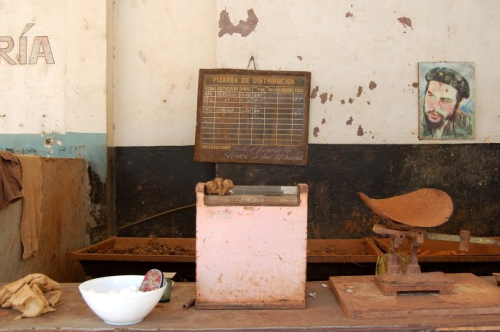
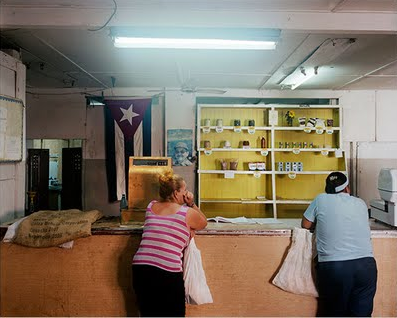
 The “hard currency collection stores*” can only be visited by those Cubans who receive remittances from friends and family abroad, or by those nationals who survive through the black market, the majority of them by taking whatever possible from their workplaces. The average salary of an ordinary worker is 450 Cuban pesos (also called “National Money”), which converts to 18 Cuban Convertible Pesos (CUC). A Chinese Panda brand TV is sold in the national network of hard currency stores for 300 CUC, meaning that this average worker would have to work seventeen months to acquire it, when the cost of the TV, according to what a functionary told me secretly, doesn’t exceed 8 dollars each, which converts into a net profit of nearly 38 times the cost.
The “hard currency collection stores*” can only be visited by those Cubans who receive remittances from friends and family abroad, or by those nationals who survive through the black market, the majority of them by taking whatever possible from their workplaces. The average salary of an ordinary worker is 450 Cuban pesos (also called “National Money”), which converts to 18 Cuban Convertible Pesos (CUC). A Chinese Panda brand TV is sold in the national network of hard currency stores for 300 CUC, meaning that this average worker would have to work seventeen months to acquire it, when the cost of the TV, according to what a functionary told me secretly, doesn’t exceed 8 dollars each, which converts into a net profit of nearly 38 times the cost.
Of course, this whole “happy dream” for the exploited Cuban worker, could be realized if he can survive for almost a year and a half without eating or grooming or dressing himself, without electricity or water, and God help him if he has a wife and child. Therefore, a common joke among workers is “they pretend to pay you, we pretend to work.”
Years ago I talked with a foreigner who had been interested in importing food to Cuba. The first thing he discovered was that the government did not care to offer a better price to the people, they are only concerned with adding up their profits.
He was alarmed by the 2.40 cents on the dollar for which a bottle of the lowest quality of oil was sold to the people. He would offer the country a business it couldn’t refuse, for example: a bottle of sunflower oil for between 9 and 11 cents per unit, including transportation to the port of entry, less than the 12 to 14 cents they were paying at the moment, without adding on the cost of the functionary who traveled abroad, his costs for food, air transportation, lodging, expenses, etc.
Despite his good offer, it was rejected. After gaining the functionaries’ trust, they explained, between invitations to restaurants and whiskey, that leaving the country was their benefit, because they received commissions from the capitalists they agreed to buy from.
A country led by a wolf, can only turn itself into a pack of wolves. “A madhouse would never be able to organize itself,” the foreigner told me and he never was interested in returning.
The worst part is that he was right.
Ángel Santesteban-Prats
Lawton Prison settlement. November 2013
*Translator’s note: A literal translation of what the government itself calls its stores that sell goods only in Cuban Convertible pesos.
Translated by: Shane J. Cassidy
28 November 2013
Cuba on the UN Human Rights Council: No One Should be Surprised / Juan Juan Almeida
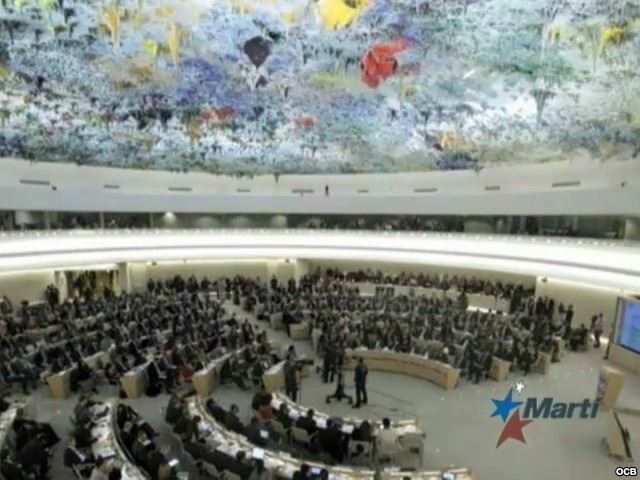 When I was a lad, it seemed a crazy thing to see the instant when the results of the elections for members of the National Assembly, the Council of State, Council of Ministers and the Executive Committee were announced. It was, or is, for the high leaders of the eccentric Cuban Revolution, a moment of acting and feigning shock, the re-elected leaders embrace each other with artful surprise, as if they did not know beforehand what would happen.
When I was a lad, it seemed a crazy thing to see the instant when the results of the elections for members of the National Assembly, the Council of State, Council of Ministers and the Executive Committee were announced. It was, or is, for the high leaders of the eccentric Cuban Revolution, a moment of acting and feigning shock, the re-elected leaders embrace each other with artful surprise, as if they did not know beforehand what would happen.
For the same reason, but with different motives, the excessive outrage seemed quite ridiculous to me, this astonishment that some displayed on learning that Cuba (the government) had been chosen to be a member of the United Nations Council on Human Rights.
Although some time ago I learned that politics carries a heavy dose of overacting, it’s hard to understand in this case the avalanche of opinions, running from hilarious outrage, to the point of lousy theatrics, through a sovereign naiveté, before the ironic reality that places the island as the country with the most votes from Latin America to occupy one of the two regional seats on the Human Rights Council during the term starting on 1 January 2014 that will run for three years.
Could so much astonishment be because they didn’t know that this appointment was expected? Did anyone really think it would be worthwhile to ask Havana to sign and/or ratify the international human rights accords?
Please, let’s be objective, the world has never been governed by the opinion of the millions of people who are underestimated daily, but by figures and statistics which, on frequent occasions, governments themselves invent, manipulate, alter, synthesize, multiply, sweeten… and you can add all the synonyms you want, because I know in “macropolitics” semantics is irrelevant.
It is well-known that compartmentalization has been and is the Cuban government’s most effective and most used weapon, as a result of which with dangerous frequency many analysts looking at the island do it from mistaken or fragmented perspectives that don’t allow them to have a real view of anything.
Meanwhile, the government itself, knowing that their capital and their exact limitations, through their embassies and different NGOs (for example CENESEX), buy into the opinions of some influences in the powerful groups, and manage to manipulate politicians, get commitments from entrepreneurs, get support from international artists, and use alliances such as ALBA. These are the new battalions that help them to transform old cannons into commercial contracts.
I wonder if at this point there is anyone who hasn’t noticed that when the world turned and the borders moved, the world map changed color.
Cuba is a poor nation, and not a bankrupt business, governed by very rich men, within a dictatorial group, with a family monopoly which, in other times, financed subversive movements, and which today invests great resources in lobbying in support of themselves in whatever international forums are held, because in their struggle, that of today, the adversary is simply an obstacle and what matters is knowing who to use as an ally to achieve your objectives.
Because for the Cuban government,as in the gangland underworld, or the strategic military academy, one’s associate is almost always a temporary comrade, who can be selected for certain issues from a list of enemies.
20 November 2013
Two Fatalities in Building Collapse in Havana / Augusto Cesar San Martin
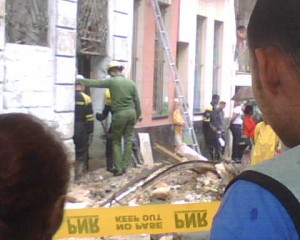
HAVANA, Cuba , November 29, 2013 , www.cubanet.org.- A man and a woman died at noon today in the collapse of a building located at 619 Campanario Street, between Reina and Salud in Central Havana.
The couple lived with seven other families on the first floor of the building declared uninhabitable.
According to eye-witnesses, the collapse began on the stairs of the two-story building. Three of the residents had time to reach the exit. The victims were sleeping when one of the walls on the second floor collapsed on the stairs.
The two children living there were in school.
Fire crews and forensic medicine worked until 4:15 pm to rescued the bodies.
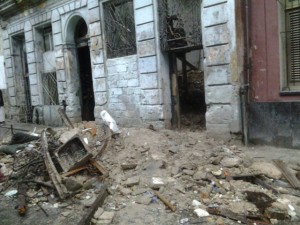
One of the neighbors said that last week the neighbors had alerted the local authorities about the danger of the building collapsing.
At 4:30 pm, a second collapse occurred, this one of the roof of a house located at 612 Zanja at Lealtad in the same municipality, alarming the neighbors.
One of the affected who went out to the Campanario Street for help said there were no casualties, during a conversation with the deputy of the Popular Power in the area.
The heavy rains of the last 24 hours have caused the Havana Bay Tunnel to be closed because of flooding, along with San Lazaro Avenue in Central Havana.
Every time it rains non-stop for several days on the capital, old buildings collapse.
Cubanet, 29 November 2013
3 of 5 / Luzbely Escobar
Translator’s note: For more about “The Cuban Five” see here.



